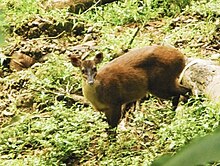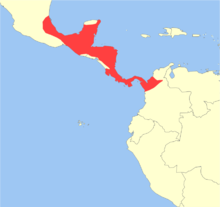The Central American red brocket (Mazama temama) is a species of brocket deer ranging from southern Mexico, through Central America, to northwestern Colombia.[2]
| Central American red brocket | |
|---|---|

| |
| Scientific classification | |
| Domain: | Eukaryota |
| Kingdom: | Animalia |
| Phylum: | Chordata |
| Class: | Mammalia |
| Order: | Artiodactyla |
| Family: | Cervidae |
| Subfamily: | Capreolinae |
| Genus: | Mazama |
| Species: | M. temama
|
| Binomial name | |
| Mazama temama (Kerr, 1792)
| |
| Subspecies | |
|
M. temama temama (nominate) | |

| |
Taxonomy
editIn 1792 Robert Kerr originally described it as a unique separate species as opposed to a subspecies.[3] It was treated as a subspecies of the red brocket (Mazama americana) from South America, but its karyotype has 2n = 50, while the latter's was initially described as having 2n = 68–70.[1] However, a more recent description gives the red brocket a variable karyotype with 2n ranging from 48 to 54, suggesting it represents several species.[4] It is sympatric with the Yucatan brown brocket (Odocoileus pandora) over part of its range. Additionally, it was estimated that Mazama temama diverged from other red brocket deer about 2 MYA. This was estimated through analysis of concatenated sequences from the mitochondrial gene ND2, Cytb, and tRNA-Pro-Control region.[5]
Habitat
editThe species is found in primary and secondary tropical forest at altitudes from sea level to 2800 m.[1]
Conservation
editIn Mexico, it is regarded as an agricultural pest by bean farmers.[1] It is probably threatened by hunting and deforestation.[1] Due to not much being known about the species, it is rated as Data Deficient on the IUCN Red List.
References
edit- ^ a b c d e Bello, J.; Reyna, R.; Schipper, J. (2016). "Mazama temama". IUCN Red List of Threatened Species. 2016: e.T136290A22164644. doi:10.2305/IUCN.UK.2016-2.RLTS.T136290A22164644.en. Retrieved 19 November 2021.
- ^ Grubb, P. (2005). "Order Artiodactyla". In Wilson, D.E.; Reeder, D.M (eds.). Mammal Species of the World: A Taxonomic and Geographic Reference (3rd ed.). Johns Hopkins University Press. p. 657. ISBN 978-0-8018-8221-0. OCLC 62265494.
- ^ Escobedo-Morales, Luis A.; Mandujano, Salvador; Eguiarte, Luis E.; Rodríguez-Rodríguez, Marco A.; Maldonado, Jesús E. (May 2016). "First phylogenetic analysis of Mesoamerican brocket deer Mazama pandora and Mazama temama (Cetartiodactyla: Cervidae) based on mitochondrial sequences: Implications for Neotropical deer evolution". Mammalian Biology. 81 (3): 303–313. Bibcode:2016MamBi..81..303E. doi:10.1016/j.mambio.2016.02.003.
- ^ Duarte, J.M.B.; Vogliotti, A. (2016). "Mazama americana". IUCN Red List of Threatened Species. 2016: e.T29619A22154827. Retrieved 19 December 2019.
- ^ Escobedo-Morales, L. A., Mandujano, S., et al. (2016). First phylogenetic analysis of Mesoamerican brocket deer Mazama pandora and Mazama temama (Cetartiodactyla: Cervidae) based on mitochondrial sequences: Implications for Neotropical deer evolution [Abstract]. Mammalian Biology, 81(3), 303-313. doi:10.1016/j.mambio.2016.02.003
- Louise Emmons (January 1997). Neotropical Rainforest Mammals: A Field Guide (2nd ed.). University of Chicago Press. ISBN 978-0-226-20721-6. OCLC 20296862.
